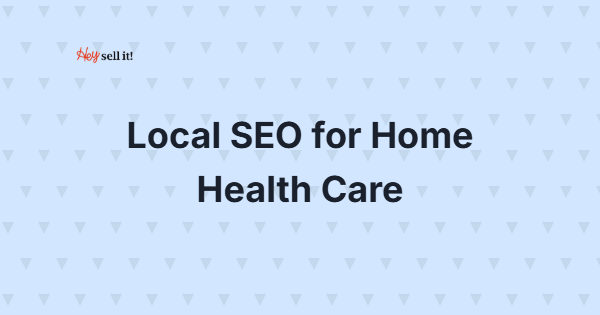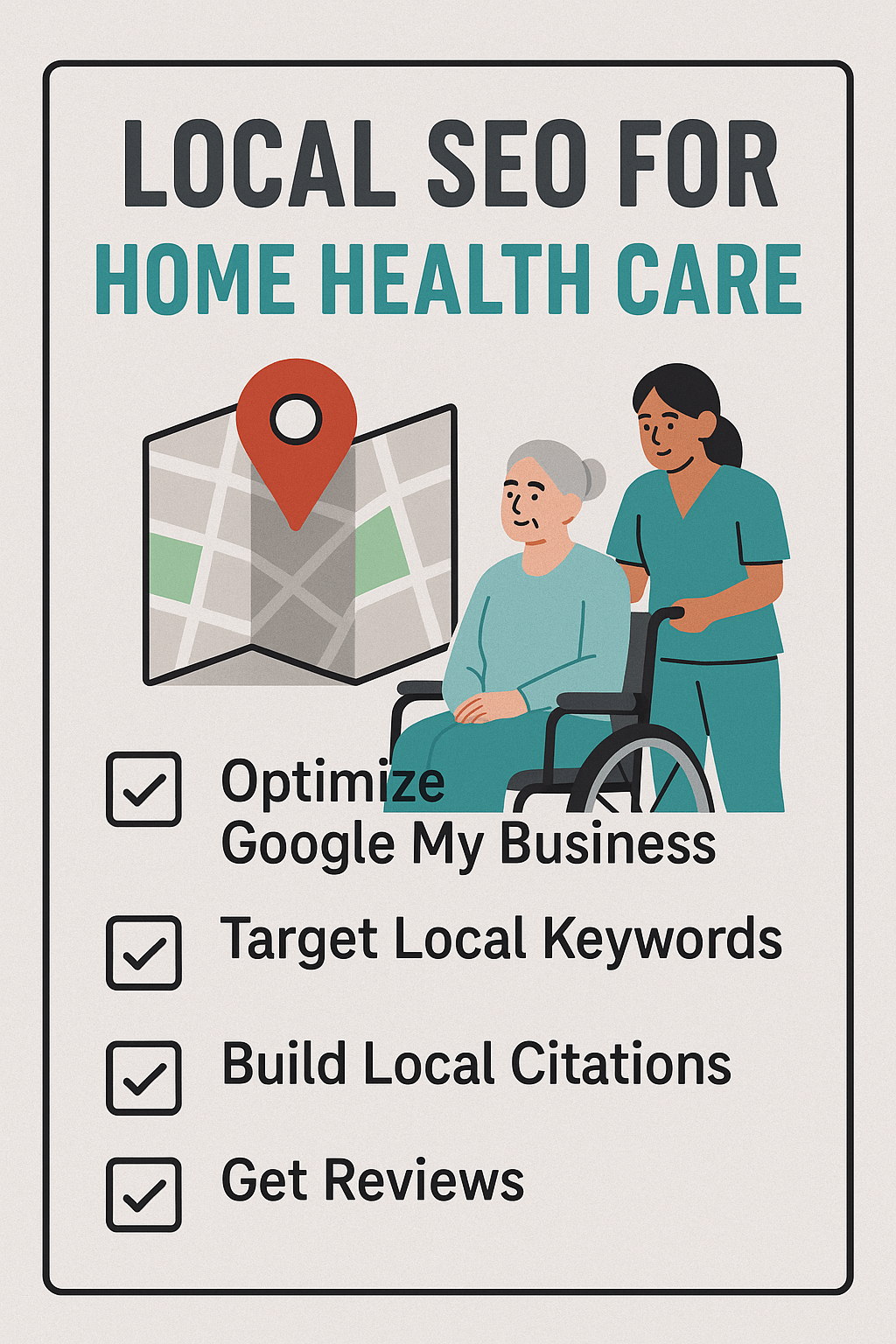Abdullah Usman
The home healthcare industry generated $146.1 billion in revenue in 2023, yet 73% of potential patients never find local providers because of poor online visibility. Here’s the challenge: while traditional businesses can freely showcase customer testimonials and case studies, home healthcare providers must navigate strict HIPAA regulations that can make or break their SEO efforts.
You’re running a home healthcare business, and your competition is fierce. Your potential patients are searching for “home care services near me” over 27,000 times monthly, but if your local SEO strategy isn’t HIPAA-compliant, you’re not just missing opportunities—you’re risking hefty fines of up to $1.5 million per violation.
Why Local SEO Matters More for Home Healthcare Than Any Other Industry
Home healthcare operates differently than traditional medical practices. Your patients can’t walk into a physical location to evaluate your services, making your online presence their first and often only impression. Local SEO becomes your virtual storefront, but it must be built on a foundation of strict privacy compliance.
Consider this: 89% of healthcare consumers research providers online before making contact, and 77% use search engines as their starting point. When someone searches “home health aide near me” or “elderly care services in [city],” your business needs to appear in those crucial top three local search results. However, unlike e-commerce businesses that can freely display customer reviews and detailed case studies, healthcare providers must carefully balance visibility with privacy protection.
The stakes are particularly high because healthcare searches often indicate urgent needs. When families search for “post-surgery home care” or “dementia care services,” they’re typically facing immediate challenges and need trustworthy, accessible information quickly.
What Makes Healthcare SEO Different from Standard Local SEO Services?
Standard local SEO strategies often rely heavily on customer testimonials, detailed case studies, and specific service outcomes—elements that healthcare providers cannot freely share due to HIPAA requirements. This creates a unique challenge where traditional SEO audit approaches may actually recommend tactics that could put your business at legal risk.
Healthcare SEO requires a specialized approach that understands both search engine algorithms and healthcare compliance regulations. While an e-commerce SEO strategy might focus on showcasing specific product results and customer photos, healthcare providers must find alternative ways to demonstrate expertise and build trust without compromising patient privacy.
The difference extends to keyword targeting as well. Healthcare searches often involve sensitive topics, and the semantic SEO approach must account for the emotional and private nature of these queries while still providing valuable, discoverable content.
Understanding HIPAA Compliance in Your SEO Strategy
HIPAA (Health Insurance Portability and Accountability Act) doesn’t just govern how you handle patient records—it directly impacts every aspect of your online marketing strategy. Any identifiable patient information, including photos, specific treatment details, or even general descriptions that could lead to patient identification, falls under HIPAA protection.
This means your on-page SEO strategy cannot include traditional testimonials with patient names, before-and-after photos, or detailed case studies that reference specific conditions or treatments. Even something as simple as “We helped Mrs. Johnson recover from her knee surgery” could constitute a HIPAA violation if Mrs. Johnson didn’t provide written consent for this specific use.
However, HIPAA compliance doesn’t mean your SEO efforts are doomed. You can still create compelling, trustworthy content by focusing on general health education, your team’s qualifications, your service processes, and anonymized information that doesn’t reveal patient identities.
How to Build Trust Without Compromising Patient Privacy
Building trust in healthcare SEO requires creativity and strategic thinking. Instead of patient testimonials, focus on showcasing your credentials, certifications, and professional affiliations. Create content that demonstrates your expertise through educational articles about conditions you treat, care tips for families, and explanations of your service processes.
For example, instead of writing “We helped 50 patients recover from stroke,” you can create content like “Our stroke recovery support process includes physical therapy coordination, medication management, and family education—services that research shows improve recovery outcomes by 40%.” This approach provides valuable information while maintaining privacy compliance.
Professional credentials become crucial trust signals in healthcare SEO. Highlight your licensed nurses, certified home health aides, and any specialized training your team has completed. These qualifications serve as trust indicators that search engines and potential patients value.
Local SEO Tactics That Work for Home Healthcare Providers
Your Google Business Profile becomes exceptionally important in healthcare local SEO because it often serves as the primary trust signal for potential patients. Ensure your profile includes accurate service hours, service areas, and professional photos of your facility and team (not patients).
Service area optimization requires special attention in home healthcare because you’re serving patients across multiple locations rather than at a single facility. Create location-specific pages for each area you serve, but focus on the services you provide rather than patient outcomes. For instance, “Home Health Services in [City Name]” pages should detail your service offerings, team qualifications, and contact information for that area.
Your local citation strategy should emphasize professional directories and healthcare-specific platforms rather than general business directories. Listings on Healthgrades, Medicare.gov, and state health department directories carry more weight for healthcare searches and provide additional credibility signals.
Content Marketing Strategies That Maintain HIPAA Compliance
Educational content becomes your primary tool for demonstrating expertise while maintaining compliance. Create comprehensive guides about conditions you treat, care tips for families, and explanations of different types of home healthcare services. This content serves multiple SEO purposes: it targets relevant keywords, provides value to potential patients, and demonstrates your expertise without referencing specific patient cases.
Blog topics that work well include “Understanding Home Health Aide Services,” “Preparing Your Home for Post-Hospital Care,” and “Questions to Ask When Choosing a Home Healthcare Provider.” These topics target commercial keywords while providing genuine value to your audience.
Video content can be particularly effective, but it must be carefully planned. Create videos featuring your staff discussing general care topics, facility tours (without patients present), or educational content about health conditions. Never include patients in videos without explicit written consent, and even then, consider the long-term implications of having patient information permanently available online.
Technical SEO Considerations for Healthcare Websites
Healthcare websites require additional technical considerations that standard SEO audits might miss. SSL certificates are absolutely mandatory—not optional—for any site handling health-related inquiries. Search engines heavily penalize unsecured healthcare sites, and patients expect secure connections when sharing personal information.
Your website’s contact forms and patient inquiry systems must be designed with privacy in mind. Implement secure form submission processes and clearly communicate your privacy policies. Consider using patient portal systems that provide secure communication channels rather than standard email forms.
Page loading speed becomes critical in healthcare because urgent searches often come from mobile devices in stressful situations. Families researching home care options may be sitting in hospital waiting rooms or dealing with emergency situations where slow-loading pages can mean lost opportunities.
Off-Page SEO Strategies for Healthcare Providers
Building authority through off-page SEO in healthcare requires a different approach than standard businesses. Focus on earning links from reputable healthcare organizations, professional associations, and educational institutions rather than general business websites.
Guest posting opportunities should target healthcare publications, caregiver resources, and professional journals rather than general business blogs. When contributing content, focus on your expertise and educational value rather than promotional messaging.
Professional networking within the healthcare community often leads to natural link-building opportunities. Partnerships with hospitals, rehabilitation centers, and other healthcare providers can result in referral relationships that benefit both your business and your SEO efforts.
Measuring SEO Success Without Compromising Privacy
Traditional SEO metrics like conversion tracking become complicated in healthcare due to privacy requirements. You cannot use standard e-commerce tracking methods that might capture patient information or health-related search queries.
Focus on metrics that respect privacy while still providing valuable insights: organic traffic growth to educational content, local search visibility for service-related keywords, and general inquiry volume rather than specific conversion tracking. These metrics provide actionable insights without creating compliance risks.
Set up separate tracking for different types of content to understand what resonates with your audience. Educational articles, service pages, and local landing pages each serve different purposes in your patient acquisition funnel, and understanding their performance helps optimize your overall strategy.
Common HIPAA Violations to Avoid in Your SEO Efforts
Never use patient names, photos, or specific treatment details in your SEO content without explicit written consent that specifically covers online marketing use. Even with consent, consider whether permanent online publication serves the patient’s long-term interests.
Avoid creating content that could indirectly identify patients through specific details about rare conditions, unique circumstances, or combinations of factors that might make individuals recognizable to their communities.
Be cautious with analytics and tracking tools that might capture sensitive search queries or personal information. Ensure your tracking implementation complies with HIPAA requirements and doesn’t inadvertently collect protected health information.
Action Points for Implementing HIPAA-Compliant Local SEO
Start by conducting a comprehensive SEO audit of your current website to identify any potential HIPAA violations in existing content. Remove or modify any content that references specific patients, treatment outcomes, or identifiable information.
Develop a content calendar focused on educational topics that demonstrate your expertise without referencing patient cases. Create comprehensive service pages that explain your processes, qualifications, and approach to care without revealing patient information.
Optimize your Google Business Profile with professional photos, accurate service information, and regular updates about your services. Encourage reviews from family members and caregivers who can share their experiences without revealing patient details.
Implement secure contact forms and inquiry systems that protect patient privacy while still allowing for effective lead capture and conversion tracking that complies with HIPAA requirements.
Building Long-Term Success Through Compliant SEO Practices
Sustainable growth in healthcare SEO comes from building genuine authority and trust within your community. This requires consistent effort in creating valuable educational content, maintaining professional relationships, and providing exceptional service that naturally leads to word-of-mouth referrals.
Your semantic SEO strategy should focus on understanding the complete patient journey, from initial health concerns to ongoing care needs. Create content that addresses questions at each stage of this journey while maintaining strict privacy compliance.
Remember that healthcare SEO is a long-term investment in your community’s health and your business’s growth. By prioritizing both search visibility and patient privacy, you build a sustainable foundation for patient acquisition that protects your business from compliance risks while genuinely serving your community’s needs.
The home healthcare industry will continue growing as the population ages, making effective local SEO more crucial than ever. By implementing these HIPAA-compliant strategies, you position your business to capture this growing market while maintaining the trust and privacy your patients deserve.


